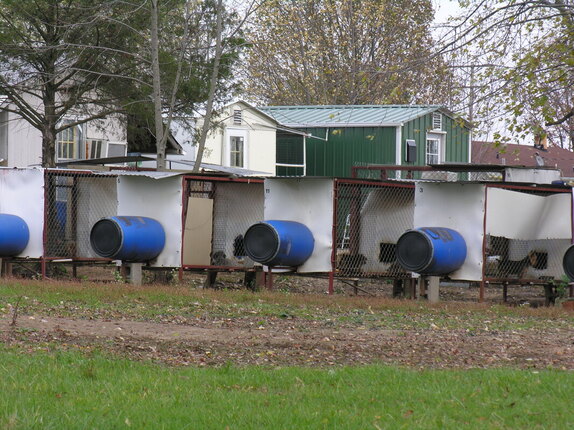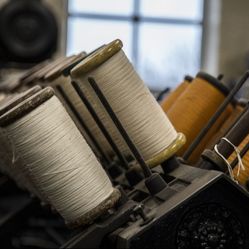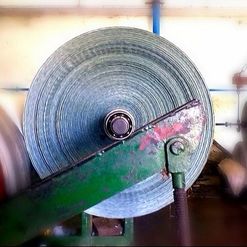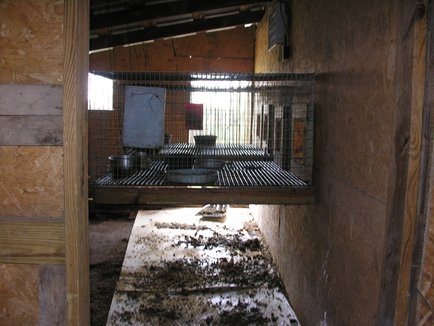 I got in a discussion with a contact of mine recently about the phrase "puppy mill." It was related to some differences of opinion about how many of us advocate to limit or end the commercial production of dogs (in ways which would shock and appall most of the dog-loving American public if they were to see, hear and smell the operations). This person and I do not agree on many topics, the most basic of which is use of the phrase "puppy mill." So, what does the phrase really mean? It depends on who you ask. For some, a puppy mill is a dog breeding operation, either large or small, in which profit is the focus of the business and in which the well-being of the dogs is of little concern or at least secondary concern. Dogs from this type of breeding operation routinely spend their entire lives in small cages. Many of the cages are wire crates which lack solid floors and are no larger than your dishwasher. The dogs are more often than not physically injured or psychologically scarred from the conditions in which they are forced to live and they receive no veterinary care at all. They have cancers, are missing eyes and parts of limbs, their teeth are likely rotted and they may have a host of other serious health issues which go unseen. They are bred repeatedly until they are no longer capable of producing profitable puppies. This is the type of business which is routinely the subject of media reports, articles written by journalists and solicitations for donations made by large animal welfare organizations. For others, a puppy mill is any commercial dog breeding operation at all even if the dogs are treated with a greater level of attention and receive regular veterinary care. Most of these dogs also spend their entire lives in cages but are simply treated better. Some are socialized, given time to exercise outside of their cages and are better prepared to be someone’s beloved pet. (For the sake of this discussion, the word "commercial" is intended to mean a money-making business which exists for the sole purpose of producing dogs to be sold to the public in some way.) There are some who go one step further and fault all dog breeding operations, even those by responsible breeders who only breed dogs periodically for families, for breed competitions or for use in some service capacity. These people proclaim that we should not "breed or buy while shelter dogs die" and see all breeders as the enemy. Looking at the words which make up the phrase, we all know what the word "puppy" means. It refers to a young dog. The word "mill" is also understood by most people. It has historically meant a building equipped with machinery for grinding grain into flour. It can also mean a factory for certain kinds of manufacture such as paper, steel, or textiles. More recently, the word has been used to describe a business or institution that dispenses products or services in an impersonal or mechanical manner, as if produced in a factory. Examples include "divorce mill" or "diploma mill." I have been told that those who breed dogs for a living, regardless of where they are located, take great offense at the phrase "puppy mill." I am told that to them, the phrase is the equivalent of a racial or ethnic slur and that if we are ever to reform the commercial dog breeding industry, we need to stop using the phrase "puppy mill" so we don’t offend these people. I simply do not agree. I have no issue whatsoever with using the phrase puppy mill to describe commercial dog breeding operations. I would not call my dentist (who breeds Black Russian Terriers for dog competitions) a puppy miller because she is a responsible breeder who has had very few litters of puppies in the almost two decades we have known each other. Her breeding of Black Russian Terriers is to perpetuate breed standards and her dogs have competed in major competitions. When looking beyond these small-time breeding operations like hers, I focus on the meanings of the individual words. Puppies are being produced. They are being produced in a factory or mill-like manner for profit. So for me, a puppy mill is any industry which produces dogs on a regular basis in any volume as a money-making venture. I appreciate the fact that some dog breeders are not happy with use of the phrase puppy mill. I presume that people who raise dogs as part of a multi-generation family business and who work hard to care for the dogs don't like being labeled in a way which causes them to be perceived in the same way as are those who see dogs as inventory, caring little for the well-being of the "breeder stock." To those people who feel offended, I would say this. The phrase is used to describe behavior related to a chosen profession producing dogs for profit. If you find the phrase offensive, that is because you are interpreting it personally, as if it is a personal attack on you as an individual. It is not. It is a reference to your mass production of dogs in an industrial or mill-like manner. If yours is an operation about which you are proud and which bears no resemblance to the types of horrid operations we read about in articles or see in programs on Animal Planet or see as the subject of marketing campaigns to solicit money to stop the objectification and abuse of dogs, by all means be proud of what you are doing. People like me will continue to seek better for dogs until we find ways as a society to either limit your production of dogs or we find ways to ensure your dogs live in better conditions more in keeping with public expectations. And then police your own industry. If you don’t want to be compared to those "lesser" operations producing dogs which horrify us all, please put your damaged feelings aside and acknowledge that there are those who share your profession who allow dogs to suffer, who abuse dogs and who neglect dogs. Work in your own way to advocate yourselves to improve your industry as a whole. Advocacy is about speaking out about things we want to change in our society. When it comes to animal welfare advocacy, we speak out on behalf of the animals who cannot speak for themselves. I think we need to careful to not blame the messenger for the fact that the message was necessary in the first place. The animal-loving public is becoming increasingly aware of, and alarmed by, what takes place in the commercial dog breeding industry. We don’t hate those who breed dogs in mass quantities as people. We disapprove of their behavior. And we want it to change or stop. Using the phrase "puppy mill" to help educate the public serves a purpose as our use of language is molded and shaped to fit our culture. It is a tool to communicate a concept. (images courtesy of Pet Shop Puppies, Inc. and George Hodan)
11 Comments
Barbara Makris
3/9/2017 10:15:19 am
I understand what you are saying but am having a personal struggle accepting the concept. I used to be what you call a "purist," one who felt no one should be breeding dogs, period, until the shelters were emptied, but then softened my stance. I even experienced the frustration of not being able to find the breed of dog I wanted to adopt since fewer were being bred and showing up in shelters. I almost weakened and took one from a well known breeder (a rehome), but my heart would not let me do that. I kept thinking that by taking a dog that would be readily adopted by someone else, another less fortunate dog would die in a shelter. So I waited until the right dog came along, 11 months later. My softened stance has now regressed, once again, as I see so many wonderful dogs of both purebred background and mixes, being euthanized through no fault of their own. I just cannot fathom why we should accept more dogs being pumped out when so many are lacking loving homes. I see people with the attitude "My breed doesn't affect the overpopulation problem." I don't agree. And while I read that euthanasia rates across the USA are declining, I don't see that figure reflected when I look at animal shelter photos of hundreds of dogs in need of homes, and I would suspect most of these dogs do not come from puppy mills, rather from people who let their dogs breed for whatever excuse they can cook up. I am 100% against puppy mills, backyard breeders, and anyone who breeds their dog. In other words, I am right back where I started--a "purist."
Reply
Paws4Change
3/9/2017 02:28:41 pm
Barbara, I hear you. And to be clear, I will never buy a dog from a breeder. I have taken this position because I know that dog breeding will continue to happen no matter how I feel about it and I do think it serves a purpose on a small scale and in some circumstances. Me being totally opposed to breeding it not going to make it stop.
Reply
3/9/2017 03:34:01 pm
I really appreciate that you always take on tough topics. My favorite line in this post "And then police your own industry." I realize that would be tough but hey, how about if the USDA did its job and had a WHISTLEBLOWER reward and hotline and legislation and process for animals? That is how citizens have the courage and incentive to help in corporations. That has proven quite successful. That would create the structure for policing, instead of the USDA SELF-REPORTING. Excellent post as always.
Reply
Paws4Change
3/10/2017 11:25:28 am
Thank you for commenting, Chris. I love your suggestions and I have much respect for you and your work on the documentary film "Dog by Dog."
Reply
Thanks for a great article!
Reply
Paws4Change
3/10/2017 07:37:40 am
I appreciate your perspective and use of the phrase puppy farm. And I absolutely agree that not all breeding operations are the same.
Reply
HI,
Reply
Barbara Makris
3/11/2017 09:52:02 am
Indeed, I too have asked why reputable (questionable term in my mind but that is another subject) breeders oppose legislation pertaining to commercial operations. In my experience, it all boils down to $. Reputable breeders tell me they spend a lot of $ to make sure their puppies are healthy, that they make little money after expenses, and new more strict regulations would make breeding a non-profit practice. So, it all boils down to $, not the welfare of dogs in general? They seem to have the attitude that only their dogs matter, that mixed breed or dogs of other breeds are not included in the euthanasia equation. I see them all as equal and deserving of a loving life. But as long as people continue to profit from cruelty this practice will go on. And as pointed out above, now the USDA is turning a blind eye to what is happening in the mass production of dogs. As if it was not bad enough before.... 3/22/2017 10:45:23 am
I want to say that because Of Harleys Dream my eyes were opened. My family serves the Humane society in this area as fosters for cats, dogs, horses etc. Our dog pound is a kill shelter, but our Humane Society pulls as many as they can, and promotes adoption.
Reply
Jewell
5/11/2017 03:13:51 pm
Hi, I live in Grove City, Oh., the small community tried to keep Petland from opening up, but to no prevail, they opened, I have contributed to the HSUS FOR YRS., I HATE PET SHOPPS THAT SELL PURE BREED PUPPIES!!!! and I hate puppy mills the most, what else can I do to prevent these poor mother and father dogs from staying in the life of MISERY!!!
Reply
Paws4Change
5/12/2017 07:50:18 am
Jewell, the best things you can do relate to activities in your own area. Try to band together with like minded people. I am guessing there are regular protests at that store and you can join the ranks of those protesting. I also recommend that you keep up with a group called Ohio Voters for Companion Animals which is the tip of the spear to bring about change specifically in Ohio. Educate yourself on the topic of mills by seeing the documentary film "Dog by Dog" (in which Mary O'Connor Shaver of OVCA appears) and reading other materials about the industry so you can be an informed advocate when you talk to people. Considering joining a Harley's Heroes group in Oho by going to this link. Harley Taylor was the 2015 American Hero Dog and was a puppy mill survivor.
Reply
Your comment will be posted after it is approved.
Leave a Reply. |
AuthorI am an animal welfare advocate. My goal is to help people understand some basic issues related to companion animals in America. Awareness leads to education leads to action leads to change. Archives
July 2024
Categories
All
image courtesy of Terrah Johnson
|



 RSS Feed
RSS Feed